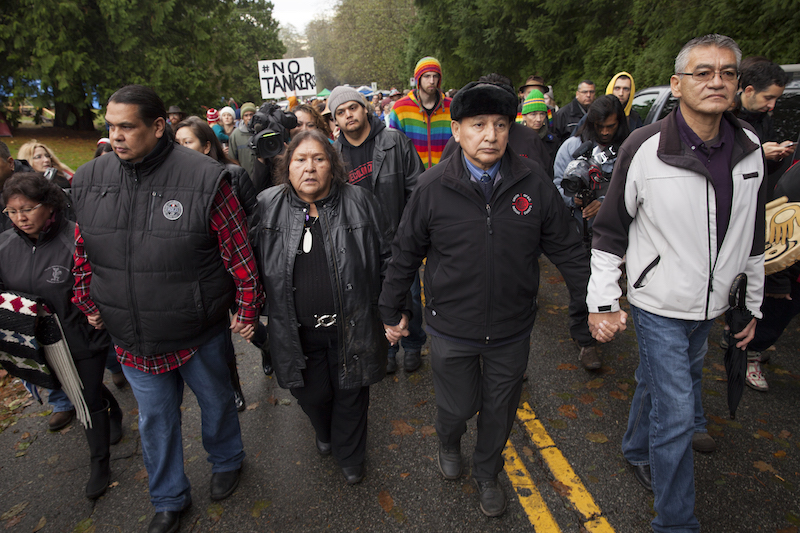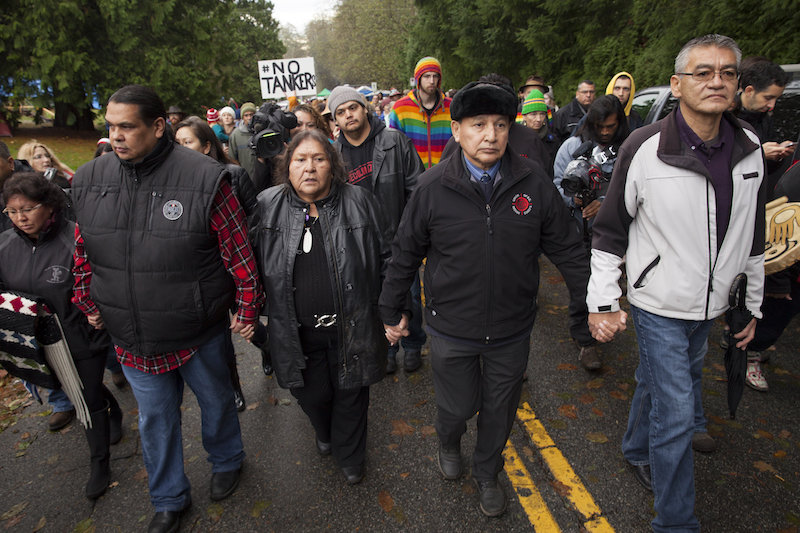This blog was originally published as a case study in Banking on Climate Change: Fossil Fuel Finance Report Card 2017, by RAN, BankTrack, Sierra Club, and Oil Change International, in partnership with 28 organizations around the world. Thank you to our many partners who contributed to and reviewed this case study. For a full list of partners, visit www.ran.org/bankingonclimatechange.
The United States’ largest energy infrastructure company, Kinder Morgan, is working to push through the Trans Mountain Expansion Project. This C$7.4 billion project would run parallel to the existing Trans Mountain Pipeline’s 1,150 kilometer route. The Trans Mountain pipeline, built in 1953, is the only West Coast link for Western Canadian oil. It is notorious for the at least 82 accidents which have together spilled over 40,000 barrels of oil — the largest of which was the 1985 disaster near Edmonton that leaked nearly 10,000 barrels.
To be clear, this is no minor “expansion” of an existing pipeline — if built according to plan, Trans Mountain’s capacity would triple, taking an additional 590,000 barrels of crude oil from the Alberta tar sands each day. The tar sands oil would be carried from Edmonton, Alberta to the Burnaby refinery on Vancouver Harbor. From there, the oil would be loaded onto supertankers to be shipped out across the Pacific.
Production of tar sands takes place in three main deposits in Alberta: Athabasca, Cold Lake and Peace River, in an environmentally destructive and highly polluting process whereby the rock-like tar sands are turned into a heavy, sludge-like substance called “diluted bitumen.” The pipeline begins in Edmonton, then crosses the Canadian Rockies, cleaving countless watersheds that feed into the mighty Fraser River. The route roughly follows the path of the Fraser down towards its delta on the Strait of Georgia, crossing Secwepemc, Sto:lo, and Coast Salish territories on its way to Metro Vancouver, which includes Sto:lo, Kwantlen, Musqueam, Squamish, and Tsleil-Waututh traditional lands.1 Community safety issues from this “expansion” include a seven-fold increase in oil tanker traffic on the Burrard Inlet — growing from five to 34 tankers every month.
As with the Dakota Access Pipeline — a highly controversial project that did not have free, prior, and informed consent (FPIC) from the Standing Rock Sioux Tribe — the Trans Mountain pipeline violates Indigenous rights. The Treaty Alliance Against Tar Sands Expansion commits the 122 signatory Indigenous Nations to oppose Kinder Morgan’s Trans Mountain Expansion pipeline. First Nations that would be directly impacted by the route and port terminal are currently fighting the project in the courts and have led heated protests on the ground — in particular the Tsleil-Waututh, Squamish, and Musqueam First Nations. The mayors of Vancouver, Victoria, and Burnaby are allied with Native nations, environmentalists, and social movements on both sides of the border in standing against Trans Mountain.
After an election in May 2017, British Columbia’s political leadership will be changing. The New Democratic Party (NDP) and the Green Party have struck a deal to challenge the Kinder Morgan pipeline project. The agreement states both parties will: “Immediately employ every tool available to the new government to stop the expansion of the Kinder Morgan pipeline, the seven-fold increase in tanker traffic on our coast, and the transportation of raw bitumen through our province.”
Kinder Morgan tried several different ways to raise the C$7.4 billion needed to build the pipeline. After a failed attempt at a joint venture, Kinder Morgan bundled up Trans Mountain with its other Canadian assets and filed for one of Canada’s biggest-ever initial public offerings (IPO), with the goal of bringing in C$1.75 billion. TD, the project’s financial adviser, led the IPO with RBC, while Bank of America, Bank of Montreal, Barclays, CIBC, Credit Suisse, Deutsche Bank, JPMorgan Chase, Mizuho, MUFG, National Bank of Canada, Scotiabank, and Société Générale also served as underwriters. Buried in the filing for this share offering was a note that the company was working on securing C$5.5 billion in new revolving credit, C$5 billion of which was pegged for Trans Mountain specifically.
On May 26, even before the IPO was launched, Kinder Morgan made a final investment decision to build Trans Mountain, contingent on the IPO’s success. On June 16, Kinder Morgan signed the $5.5 billion credit agreement to fund Trans Mountain, led by the major Canadian banks, in which 23 banks tied themselves to the project that could be “Standing Rock North.” Even after many received a warning letter from over 20 Indigenous and environmental organizations, the following financial institutions decided to directly finance Kinder Morgan’s Trans Mountain:
RBC, CIBC, Scotiabank, TD, Bank of America, Bank of Montreal, Barclays, JPMorgan Chase, MUFG, Mizuho, National Bank of Canada, China Construction Bank, HSBC, Sumitomo Mitsui, Suntrust, Alberta Treasury Branches, FIPPGV/PX, Desjardins, Bank of China, Siemens, United Overseas Bank, Canadian Western Bank, and ICBC.
Banks supporting the project have failed to learn the lessons from DAPL. Public opposition to this project and the unethical banking behind it will only grow as Kinder Morgan tries to push it forward. Over 21,000 people have signed a pledge with the Union of British Columbia Indian Chiefs’ Coast Protectors, vowing to do “whatever it takes” to stop the pipeline’s encroachment.Notes:
Notes:
-
Most of British Columbia is unceded land without treaties. “Indian Land,” First Nations – Land Rights and Environmentalism in British Columbia, accessed June 2017.
Click here for more on the financing behind Kinder Morgan’s Trans Mountain pipeline.

